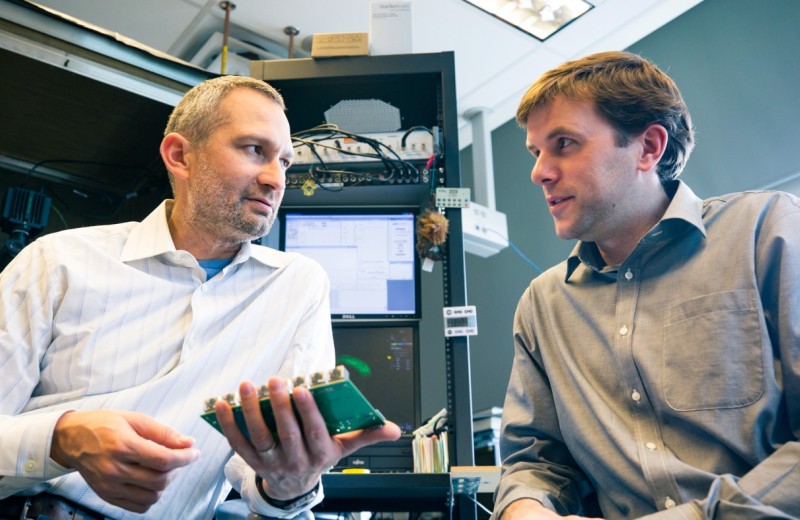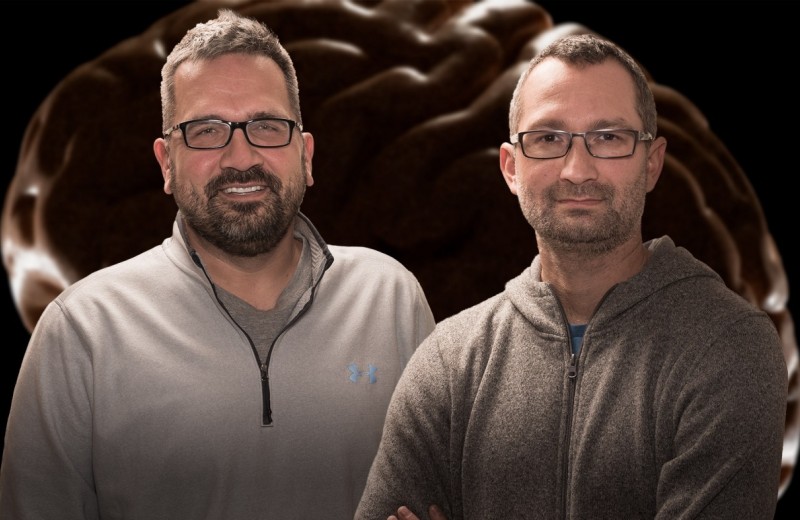Gladstone NOW: The Campaign Join Us on the Journey✕

Scott Owen is a staff scientist in the laboratory of Anatol Kreitzer, PhD. He joined Gladstone in 2013 as a postdoctoral scholar, after completing his graduate studies in molecular and cellular physiology at Stanford University.
What brought you to Gladstone?
I was looking for postdoc labs to fit my training and research goals, so Anatol Kreitzer’s lab is what initially brought me to Gladstone. When I came to interview, I immediately appreciated the energetic and collaborative culture. My graduate advisor reinforced this decision by wholeheartedly endorsing Gladstone as a special place to do science.
What do you like about Gladstone?
It’s a fantastic work environment, where everyone is passionate about doing high-quality science, and also doing everything they can to develop graduate students and postdocs.
Were you interested in science as a child?
My parents, who are both scientists, were worried I was too interested in science and actually invested significant energy into helping me explore other careers. However, I’ve always been incurably interested in understanding how things work, and I spent large portions of my childhood either building things or taking them apart.
When a preschool teacher once asked my class what we wanted to be when we grew up, instead of declaring that I wanted to be a firefighter or an astronaut like many other children, I stated that I wanted to become a scientist. The teacher wasn’t sure I knew what that was, but when asked, I reportedly told her that, “a scientist is someone who figures out how things work.” I find it hard to believe that I knew what I was getting into at that age, but as soon as I started taking science classes in college, and got my first taste of working in a research lab, I knew this was the only career for me.
Why did you decide to go to graduate school?
I did my undergraduate training in physics, which I loved. By the time I graduated, I knew that I wanted to go into research, but I realized the questions I most wanted to answer were in neuroscience rather than modern physics. I wanted to assure myself this was a solid career interest and not just a passing phase, so I took a few years to work in neuroscience labs and gain experience before starting graduate school.
What or who influenced your decision to work in science?
I don’t think this was a single decision for me, as much as a growing certainty that science is the career for me. This path must have started with my parents, but I have been lucky to work with an unbroken stream of truly exceptional mentors throughout my training.
What do you do when you are not working?
I used to spend a lot of time playing soccer, reading, traveling, or hiking. Now I spend a lot more time with building blocks, changing diapers, playing trains, digging in sandboxes, and reading children’s books. This transition happened about 3 years ago, curiously timed with the birth of our first child.
If you could learn to do anything, what would it be?
I’d like to know how to play the piano or the guitar. They are nice, social instruments that can quietly bring people together. Instead, when I was young, I learned to play the trumpet. I haven’t tried, but I imagine if you pull out your trumpet at a friend’s party, or around a campfire, it doesn’t necessarily enrich everyone’s experience.
What is your hidden/unique talent?
At one point in my life, I got to be quite good at foosball.
Name one thing that not many people know about you.
In high school, I briefly played trumpet in a ska band. This was especially challenging because I didn’t really listen to ska music.
If you could meet any scientist from any point in time, who would it be and why?
This is a tough choice, but I think I would choose Alan Hodgkin. I received his autobiography as a gift before starting graduate school and he remains one of my all-time heroes. His personal and scientific strength, courage, and integrity are immense. He started to revolutionize our understanding of neuronal physiology, then had to set everything aside mid-career to develop radar and help win the battle of Britain, before returning to finish his research after the war.
Young Scientists Committed to Finding Treatments for Neurodegenerative Diseases
Young Scientists Committed to Finding Treatments for Neurodegenerative Diseases
The 2020 Berkelhammer Scholars break new ground in research on dementias, Parkinson’s disease, and neuropsychiatric disorders
Donor Stories Parkinson’s Disease Alzheimer’s Disease Dementia Neurological Disease Akassoglou Lab Kreitzer Lab Mahley Lab Mucke Lab Nakamura LabNew Study Explains How Your Brain Helps You Learn New Skills
New Study Explains How Your Brain Helps You Learn New Skills
Gladstone scientists show how a type of neuron improves procedural learning
News Release Research (Publication) Neurological Disease Kreitzer LabStudying the Brain to Treat the Mind
Studying the Brain to Treat the Mind
Gladstone scientists are mapping the connections and functions of brain cells to identify new drug targets to treat psychiatric disorders.
Kreitzer Lab Krogan Lab CRISPR/Gene Editing



